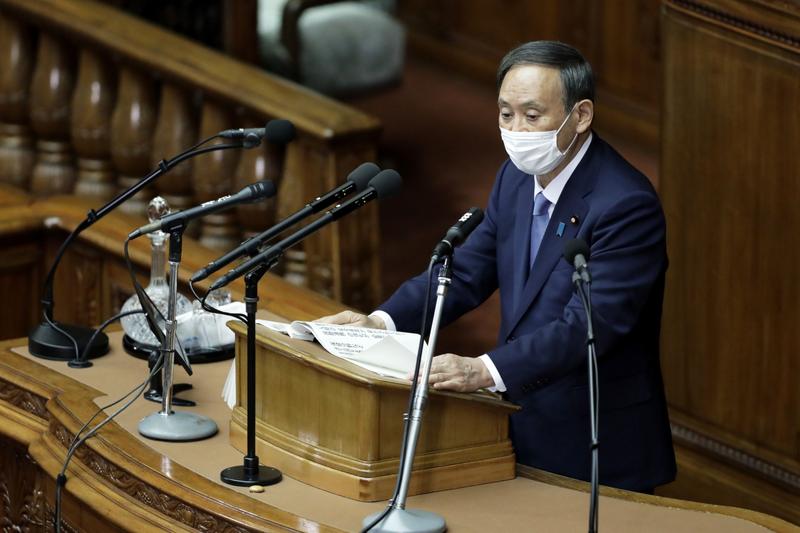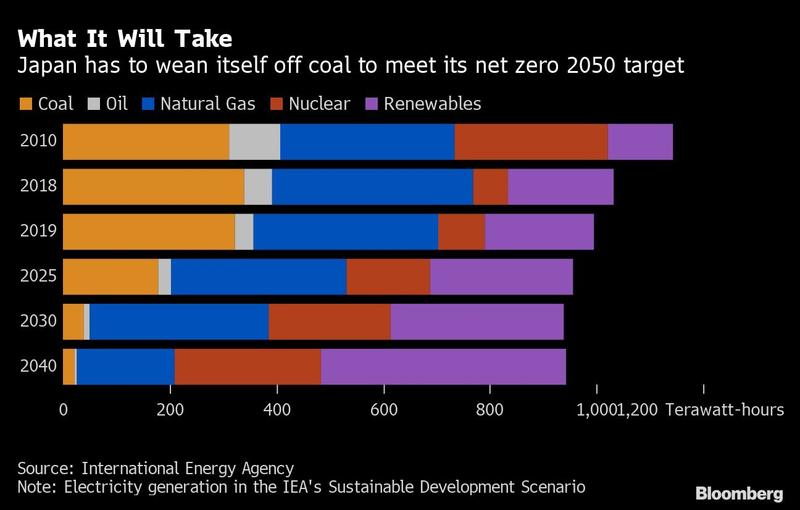 Yoshihide Suga delivers his policy speech during an extraordinary session at the lower house of the parliament in Tokyo on Oct 26, 2020. (PHOTO / BLOOMBERG)
Yoshihide Suga delivers his policy speech during an extraordinary session at the lower house of the parliament in Tokyo on Oct 26, 2020. (PHOTO / BLOOMBERG)
Japan will need to more than quadruple the pace at which it shuts down coal plants and rapidly ramp up renewable energy capacity over the next decade to meet its new climate pledge to zero out emissions by 2050.
New Prime Minister Yoshihide Suga on Monday confirmed that the world’s fifth largest emitter and third biggest economy will become the latest country to set a goal in line with the Paris Agreement to limit global warming.
Suga on Monday confirmed that the world’s fifth largest emitter and third biggest economy will become the latest country to set a goal in line with the Paris Agreement to limit global warming
It comes after China announced it would go carbon neutral by 2060 and European Union ministers agreed to a binding 2050 climate neutrality goal. Currently six countries around the world have set the mid-century in law with several more to follow, according to the Energy and Climate Intelligence Unit.
While all new long-term goals set a direction of travel for investors and have been widely welcomed, details on how they plan to get there are currently lacking.
READ MORE: NZ's Ardern vows to phase out coal-fired boilers in climate push
A spokesman for United Nations Secretary-General Antonio Guterres said he looks forward to “concrete policy measures” from Japan, including a revised 2030 climate target, known in UN terms as a Nationally Determined Contribution.
Currently Japan’s 2030 climate policy published earlier this year is out of kilter with the new target. The NDC isn’t ambitious enough to deliver on the mid-century goal, and the government has said it’ll be updated.
Today, coal accounts for more than a third of Japan’s power needs - a share that rose after the Fukushima nuclear disaster in 2011 that led the government to mothball its atomic fleet.Despite a government plan announced earlier this year to close 100 inefficient coal-fired power plants, Japan is still targeting coal to provide about a quarter of the nation’s power needs by 2030 under its current plans.
Japan needs to “start decommissioning coal power - and as an absolute minimum, Japanese companies must stop building and financing new coal power abroad,” said Eric Pedersen, head of responsible investments at Nordea Asset Management.
To fall in line with the Paris Agreement, Japan’s use of coal would need to fall to just 4 percent of the energy mix by 2030, the IEA says. In that scenario, coal power capacity would drop from 51 gigawatts in 2019 to 17 gigawatts by 2040.
ALSO READ: Beijing's climate pledge could pave way to net-zero global economy
 Japan may change its 2030 power mix goals, which are currently being reviewed by a panel of specialists and could be revised in the nation’s basic energy plan next year, the Minister of Economy, Trade and Industry Hiroshi Kajiyama said Monday.
Japan may change its 2030 power mix goals, which are currently being reviewed by a panel of specialists and could be revised in the nation’s basic energy plan next year, the Minister of Economy, Trade and Industry Hiroshi Kajiyama said Monday.
In that same Sustainable Development Scenario, renewable sources such as solar, wind and hydropower would need to account for a third of energy by 2030. By 2040, renewables would be supplying almost half of all power.
Cheap renewables already exist and what’s needed to accelerate a transition to cleaner power in Japan are “adequate market rules, regulatory measures and distribution infrastructure that prioritizes renewable energy supply,” said Shin Furuno, a senior manager with Asia Investor Group on Climate Change.
Japan’s announcement marks an important shift for a country that has historically slowed progress in international climate talks, says Rachel Cleetus, policy director and lead economist at the Union of Concerned Scientists.
“We are seeing this as a hopeful sign that a pivot moment is coming and because of that we’re going to want to see what the details are - what is the commitment that is going to happen by 2030,” she said in an interview.



